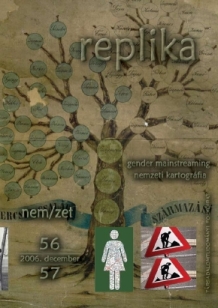Közpolitikai keretelemzés: koncepciók a nemek közti egyenlőségről
Framing Gender Equality
Author(s): Andrea Krizsán, Violetta ZentaiSubject(s): Gender Studies
Published by: Replika Alapítvány
Keywords: gender; inequality; equality; frame analysis; framing; discourse; policy; gender mainstreaming; domestic violence; European Union; MAGEEQ
Summary/Abstract: The following block elaborates the method of critical frame analysis in the field of gender policies, using both Myra Marx Ferree and William A. Gamson’s theoretical framework and the research results of the MAGEEQ Project conducted in six countries, including Hungary between 2003 and 2005. According to Ferree and Gamson’s model, social and political injustices concerning different social groups can be explained by the inequality of recognition and redistribution, both of which intersect with the two dimensions of the weberian conception of power: autonomy and authority. The way in which these two dimensions are explored and connected to the governance of gender and the gender of governance within the analysis of the framing of abortion discourses in the USA and Germany of the same period, also provides the methodological background for the MAGEEQ research. Mieke Verloo argues in her paper for the necessity of critical frame analysis while examining gender policies in the European Union. She focuses on the issues of gender mainstreaming and explores the opportunities, which frame analysis might offer in terms of dealing with gender inequality as a policy problem. Regarding the last two articles, Andrea Krizsán and her co-authors apply the methods defined by Verloo in her essay, and present the results of the research conducted in the Netherlands and Hungary, as well as at the level of the European Union itself. Krizsán, Paantjens and van Lamoen analyse and compare the framing of discourses on domestic violence at the national and EU level, while Zentai and Krizsán explore the framing of gender equality policies, and demonstrate the relevance of a gender mainstreaming strategy, especially in the case of Hungary.
Journal: Replika - Társadalomtudományi folyóirat
- Issue Year: 2006
- Issue No: 56-57
- Page Range: 107-108
- Page Count: 2
- Language: Hungarian

